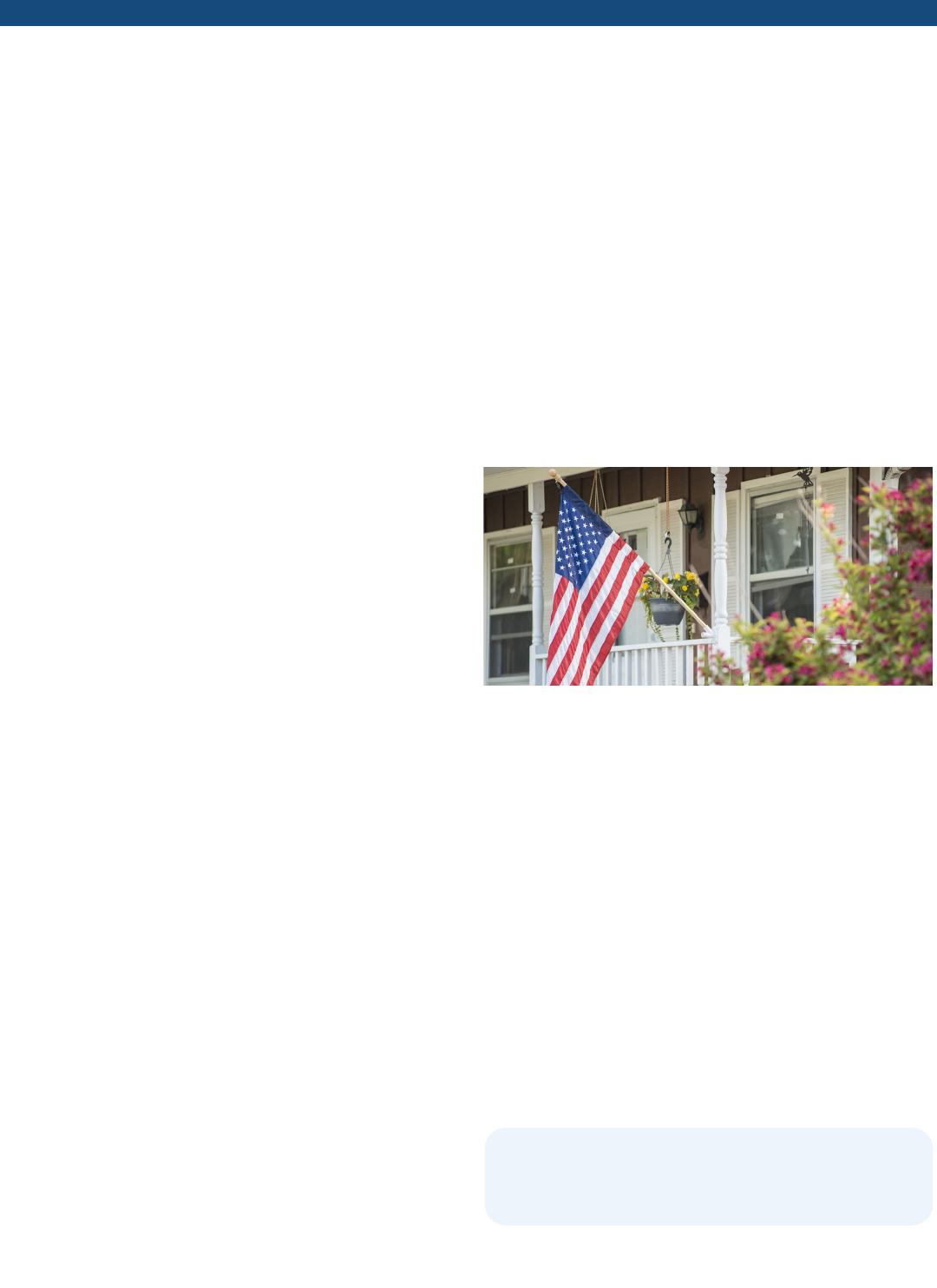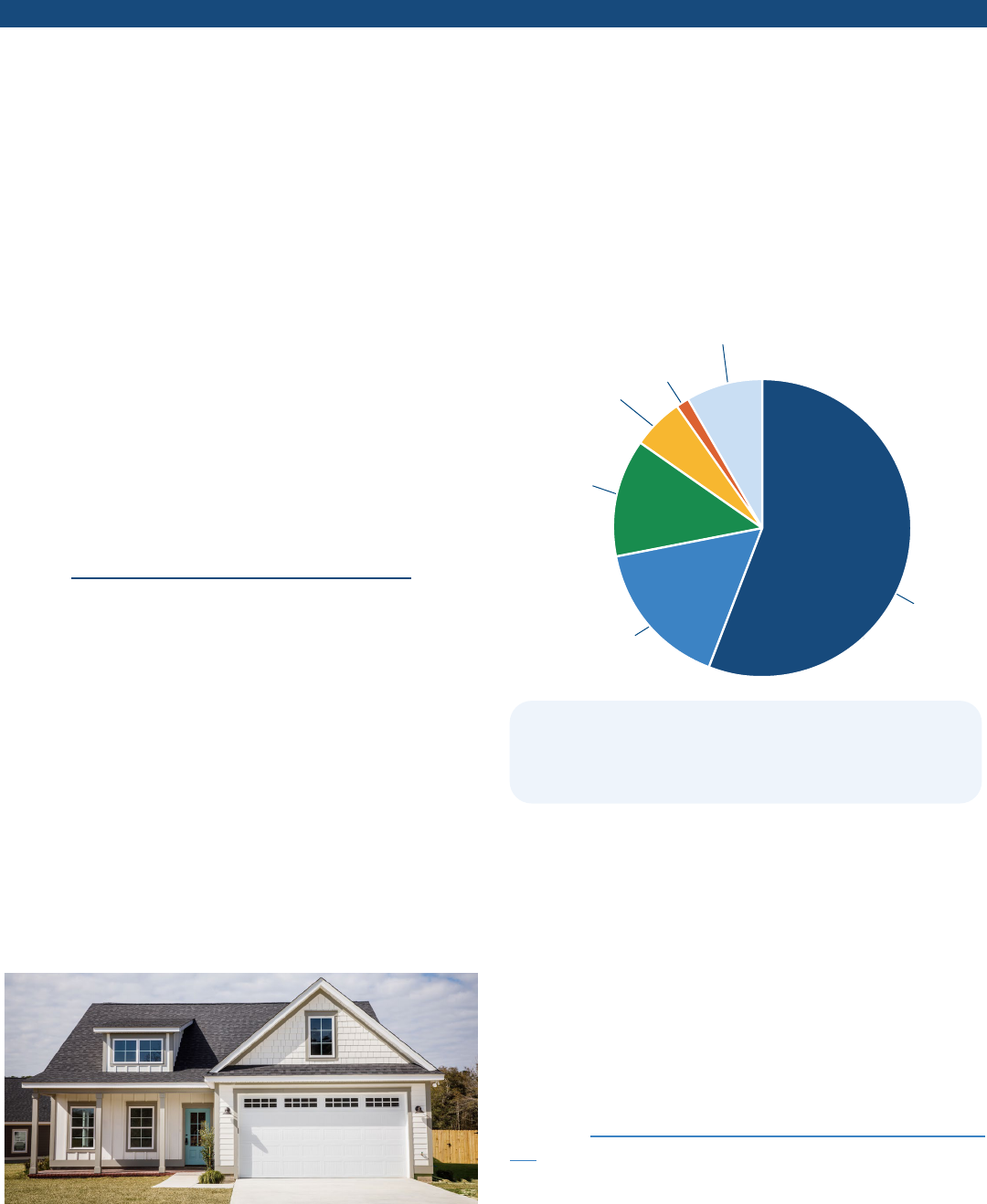
1
WASHINGTON STATE DEPARTMENT OF REVENUE
In Washington state, all real and personal property is
subject to tax unless specically exempted by law.
Property tax was the rst tax levied in the state of
Washington. Today, property tax accounts for about
30% of total state and local taxes. It connues to be the
most important revenue source for public schools, re
protecon, libraries, and parks and recreaon.
The informaon contained in this publicaon is current
at the me of producon. However, state tax laws, their
interpretaon, and their applicaon can change because
of legislave acon, reviews, or court decisions. This
publicaon will not reect these changes.
Property values
State law requires that assessors appraise property at
100% of its true and fair market value in money, according
to the highest and best use of the property. Fair market
value, or true value, is the amount of money that a willing
and unobligated buyer is willing to pay a willing and
unobligated seller.
Real property
Real property includes land, improvements to land,
structures, and certain equipment axed to structures.
Characteriscs of real property that inuence the value
include but are not limited to zoning, locaon, view,
geographic features, easements, covenants, and the
condion of surrounding properes.
The assessor values real property using one or more of
the following appraisal methods:
• Market or sales comparison approach to value is
determined, or esmated, based on mulple sales of
similar properes. Most residenal property is valued
using this method.
• Cost approach to value is determined based on the
cost of replacing an exisng structure with a similar
one that serves the same purpose. This method is
commonly used to value new construcon.
• Income approach to value is determined based on the
income producing potenal of the property. This
method is used primarily to value business property.
Personal property
The primary characterisc of personal property is
mobility. Personal property includes furnishings,
machinery and equipment, xtures, supplies, and tools.
Most personal property owned by individuals is
specically exempt. However, if these items are used in
a business, personal property tax applies. For detailed
informaon about personal property tax, please refer to
the Personal Property Tax publicaon.
Changes to property values
All counes revalue properes each year and are required
to do physical inspecons at least once every six years.
If your appraised property value changes, you will receive
a change of value noce that lists the old and new
appraised value of land and improvements. By comparing
the two values, you can determine if your appraised
property value has increased or decreased.
The assessed value of your property may be less than the
appraised value if you are receiving any type of property
tax exempon or reducon.
Valuaon noces are not tax bills. An increase in value
does not necessarily mean that next year’s property taxes
will increase at a proporonate rate.
Homeowner’s Guide to
Property Tax
This fact sheet provides general informaon about Washington’s
property tax. For more informaon or to get answers to specic
quesons, please contact your local county assessor’s oce.
JUNE 2023

2
WASHINGTON STATE DEPARTMENT OF REVENUE
Property tax rates and limitaons
Property tax rates are expressed in dollars per thousand
dollars of assessed property value. Assessors set the
levy rate based on the taxing district’s budget request,
the total assessed value of the taxing district, and any
applicable levy limitaons.
Property tax levy limitaons restrict or limit increases to
property tax rates. Two such limitaons include the One-
Percent Constuonal Limit and the Levy Limit.
The 1% constuonal limit
Washington State’s Constuon limits the regular (non-
voted) combined property tax rate that applies to an
individual’s property to 1% of market value ($10 per
$1,000). Voter approved special levies, such as special
levies for schools, are in addion to this amount.
The levy limit
The levy limit applies to a taxing district’s levy amount,
and not to increases in the assessed value of individual
properes. The limit is based on the populaon of the
district as well as the district’s need to increase revenue.
The law restricts taxing districts from levying, in any year,
more than a 1% increase in its regular, non-voted levy
over the highest amount that could have been levied since
1985.
A taxing district with a populaon below 10,000 must
adopt a resoluon/ordinance to be able to increase its
levy up to the 1% limit.
Taxing districts with a populaon of 10,000 or more are
limited to the lesser of 1% or the rate of inaon with the
adopon of a resoluon/ordinance. If the rate of inaon
is less than one percent, the district could increase its
levy up to the 1% limit if it can show substanal need for
addional funds and its governing board passes a second
resoluon/ordinance.
Because the levy limit does not include new construcon,
annexaons, and voter approved excess levies, a taxing
district’s actual revenue increase may be greater than 1%.
Appeal of true and fair market value
If you do not agree with the assessed value of your
property, you are encouraged to contact your local county
assessor’s oce. You can nd a full list here: dor.wa.gov/
CountyContacts.
Disagreements of property values are oen seled at this
level. You may request copies of the comparable sales
informaon the assessor used to value your property.
If you are unable to reach an agreement, you may le an
appeal with the county board of equalizaon (BOE) in the
county where the property is located. Appeal forms are
available at the assessor’s oce, BOE oce or
dor.wa.gov/forms-publicaons/forms-subject/property-
tax-forms#Appeals
The completed peon must be led with the BOE by July
1 of the assessment year you are appealing or within 30
days of the date the change of value noce was mailed,
whichever date is later. Some counes have extended
the ling deadline up to 60 days. Please check with the
Board of Equalizaon in the county where the property is
located to determine your ling deadline.
If you or the assessor disagrees with the BOE
determinaon, their decision can be appealed to the State
Board of Tax Appeals (BTA). If the appeal at the BTA is a
“formal” appeal compared to an “informal” appeal, the
decision made by the BTA can be appealed in Superior
Court.
Informaon needed to appeal
The appeal form must include specic reasons why you
believe the assessor’s valuaon is incorrect. Examples may
include an appraisal of your property as of the assessment
date in queson, excessive deterioraon of your property
or sales of similar properes reecng a lower value for
your property. Statements that the assessor’s valuaon is
too high or property taxes are excessive are not sucient
reasons.
For a successful appeal, you must provide market
evidence that clearly shows the assessor’s valuaon is
incorrect. This evidence may include informaon on sales
of comparable properes in your area or documentaon
about condions of the property that the assessor may
not have known. For example, the land is not suitable for
a sepc system or is not suitable for a building site.
If you have any quesons about appeal procedures,
please contact your local BOE or the assessor’s oce. The
telephone numbers are listed in the county government
secon of the telephone directory.
You must provide market evidence that the
assessed value does not reect true and fair market
value.

3
WASHINGTON STATE DEPARTMENT OF REVENUE
Property tax rates vary
Many factors determine property tax rates, the amount
of property tax due on comparable properes will
vary throughout a county. The three main factors that
determine the tax rate include:
• Various combinaons of taxing districts in dierent
areas of the county.
• Budget amounts for each taxing district.
• Voter-approved special levies
and bonds.
Calculang your taxes
If you know the assessed value of your property and
the tax levy rate, you can calculate the amount of tax.
For example, if the assessed value of your property is
$150,000 and the levy rate is $9.41 per thousand dollars
of value, your tax will be $1,411.50.
$150,000 x .00941 ($9.41 per $1,000)
$1,411.50 tax liability
How to pay your property taxes
Property tax statements are mailed by the county
treasurer in February of each year. To avoid interest and
penales, at least half of the amount due must be paid by
April 30 (if the tax is less than $50 it must be paid in full by
April 30) and the balance by October 31. You can pay your
property tax in person or by mail. Some counes are now
accepng electronic payments via the county treasurer
website. Check with your county treasurer to see if this
opon is available to you. When paying by mail, be sure to
write the tax parcel or account number on your check and
include the tax statement payment stub.
Many lending companies pay the property tax for the
homeowner from a property tax reserve account. In
this case, tax statements are sent directly to the lending
company. If your lending company pays the tax directly
and you would like to receive informaon, please contact
your local county treasurer’s oce.
Quesons
If you have quesons about paying your property taxes,
please contact your local county treasurer’s oce.
Where your property tax money goes
Reducons, exempons, deferrals and
assistance
Reducons
Destroyed property
Any real or personal property that has been destroyed
in whole or part, or is in an area that has been declared
a disaster area by the governor or the county legislave
authority and has been reduced in value by more than
20% may be eligible for a property assessment reducon
and or abatement of property taxes. Destroyed property
form applicaons are available at your assessor’s oce or
on line at dor.wa.gov/sites/default/les/2022-02/64-0003.
pdf.
Current use program and designated forest land
Owners of agricultural, open space, mber land, or
designated forest land may qualify for a reduced
assessment under the current use program or as
designated forest land. However, addional tax, interest,
Ports
*Other
Schools
Counes
Cies &
Towns
Fire
* Other includes regional libraries, parks and recreaon,
emergency medical, and hospital districts. (Distribuon of 2015
tax year)
56%
16%
12.7%
5.5%
8.2%
1.5%

4
WASHINGTON STATE DEPARTMENT OF REVENUE
and penales or compensang tax may apply when
property is removed from classicaon.
Applicaons must be received by Dec. 31 for a reducon
in assessment the following year. Applicaon forms are
available through the assessor’s oce.
Exempons
Property tax exempon for senior cizens and disabled
persons
This program freezes the value of your residence (as
of January 1 of the inial year of applicaon), exempts
all excess levies, and may exempt a poron of regular
levies, thereby reducing the amount of property tax due.
Senior cizens, veterans with a 100% service-connected
disability, and disabled persons may qualify. Household
income determines eligibility and level of exempon. The
county assessor approves or denies applicaons for this
program.
Three-year tax exempon on value of remodel
If you improve your single family residence such as adding
a new room, deck, or pao, you may qualify for a three-
year tax exempon on the value of the improvements.
Normal maintenance does not qualify. To receive the
exempon, you must apply through your local county
assessor’s oce prior to beginning your remodeling
project.
Other exempon
Churches, government enes, and many nonprot
agencies are exempt from property tax if they use
property for a tax-exempt purpose. The Department of
Revenue determines which properes are entled to the
exempon based on laws enacted by the Legislature.
Deferrals
Under these programs, the state of Washington pays
all, or a poron, of your property taxes on your behalf.
Unlike the tax exempons, deferred taxes are a lien
on the property. The lien becomes payable, together
with interest, upon sale, transfer, or inheritance of the
property, or when the home is no longer your primary
residence. The county assessor approves or denies
applicaons for the deferral programs.
Property tax deferral program for senior cizens and
disabled persons
If qualied, you can defer your property taxes and special
assessments in an amount up to 80% of the equity in your
home. Senior cizens and disabled persons may qualify.
Household income and equity determine eligibility. The
current interest rate is set in statute and is 5%.
Property tax deferral program for homeowners with
limited income
If qualied, you can defer your second half property taxes,
due in October, in an amount up to 40% of the equity in
your home. There is no age or disability requirement but
you must have owned your home for at least ve years.
Household income and equity determine eligibility. The
interest rate varies annually, as provided in statute, and is
based on an average of the federal short-term rate, plus
2%.
Assistance
Property tax assistance for widows or widowers of
veterans
This program is a grant assistance program to help you
pay property taxes. Senior cizens and disabled persons
who are widows or widowers of a veteran may qualify.
Age or disability, household income, and your spouse’s
veteran status at the me of his/her death determine
eligibility for this program. The Department of Revenue
administers this program and approves or denies claims
for assistance.

5
WASHINGTON STATE DEPARTMENT OF REVENUE
PT0012 06/02/2023
Important dates to remember
January 1
Real and personal property is valued for taxes due next
year.
March 31
Applicaons due for Senior/Disabled Deferral and Widow/
Widower Assistance.
April 30
First half of property taxes due.
Personal Property lisng forms due to assessor.
May 1
1% per month (12% per annum) assessed on delinquent
taxes.
June 1
3% penalty assessed on current year’s delinquent taxes.
July 1
Deadline for appeals to the County Board of Equalizaon
on current year’s assessment; or 30 days from date of
nocaon, whichever is later.
August 31
New construcon placed on current assessment roll at the
valuaon assessed July 31.
September 1
Limited Income Deferral applicaons due.
October 31
Second half of property taxes due.
December 1
8% penalty assessed on current year's delinquent tax.
December 31
Current Use Program and Designated Forest Land
applicaons due.
Property tax exempon applicaons for senior cizens
and disabled persons due.
For general informaon, contact the
Department of Revenue
• Telephone Informaon Center, 360-705-6705.
• dor.wa.gov.
• For tax assistance or to request this document in an
alternate format, visit dor.wa.gov or call 360-705-
6705. Teletype (TTY) users may use the Washington
Relay Service by calling 711.
Need more informaon?
The following publicaons are available from your local
county assessor’s oce. You may also obtain a copy from
the Department of Revenue online at dor.wa.gov or by
calling 360-534-1400.
• Personal Property Tax.
• Nonprot Organizaons.
• Property Tax Deferrals for Senior Cizens and People
with Disabilies.
• Property Tax Deferrals for Homeowners With Limited
Income.
• Property Tax Exempons for Senior Cizens and
People with Disabilies.
• Assistance Program for Widows or Widowers of
Veterans.
• Open Space Taxaon Act.
• Appealing your Property Tax Valuaon to the County
Board of Equalizaon.
Quesons
Your local county assessor’s oce can answer quesons
regarding:
• Assessed values.
• Appeals.
• Personal property.
• Current Use Program and Designated Forest Land.
• Property Tax Deferrals for Senior Cizens and People
with Disabilies.
• Property Tax Deferrals for Homeowners With Limited
Income.
• Property Tax Exempons for Senior Cizens and
People with Disabilies.
Your local county treasurer’s oce can answer quesons
regarding:
• Tax statements.
• Paying property tax.
